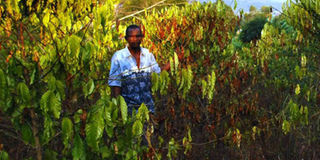Dry spell frustrates Masaka farmers

Ali Ssenabulya, a farmer at Gayaza village in Masaka District, walks through his coffee plantation which has been affected by the dry spell. PHOTO BY BRIAN MUGENYI.
MASAKA- Farmers in greater Masaka sub-region are counting losses due to the prolonged dry spell that has scorched crops in the area.
The most affected crops are coffee, groundnuts, beans and maize and experts warn that hundreds of thousands of residents may face hunger if nothing is done.
Mr Lutankome Sentamu, the Uganda Coffee Development Authority (UCDA) regional manager in charge of central region, attributed the situation to low rainfall in most parts of Masaka.
According to Mr Ssentamu, although the first planting season usually starts in March and lasts till June, this year, the rain started rather late in April and ceased in May, leaving most crops vulnerable to the hot sun.
“A change in rain patterns affects coffee just like any other crops,” he said, during a tour of coffee factories in Masaka, last week.
Mr Sentamu, who was leading a team of officials from UCDA, was astonished by the low activity at most of the coffee factories, which would have been busy around this time of the year.
Mr Bashir Busulwa, a coffee trader in Bukomasimbi District, said all their hopes are now hinged on the December coffee season.
“Even if it rains now, the damage has already been done. We are now praying for the next season,” he said.
Hajj Abdul Kintu, a cereal farmer in Kalungu District, said all his five acre plantation of maize withered one month after germination.
Mr Ssentamu said government plans to embark on a massive coffee replanting campaign across the country in a bid to achieve government’s goal of exporting 20 million coffee bags by 2020
“We are planning to distribute 300 million coffee seedlings every year,” he said.
In this financial year’s budget, close to Shs60b was set aside to facilitate the campaign.
Masaka sub-region was once famous for matooke and coffee production but this has since changed due to changing rain patterns.
According to Uganda National Meteorological Authority latest forecast, the dry spells, currently battering most parts of the central region, are likely to continue until mid-August or early September when seasonal rain is expected to start.




